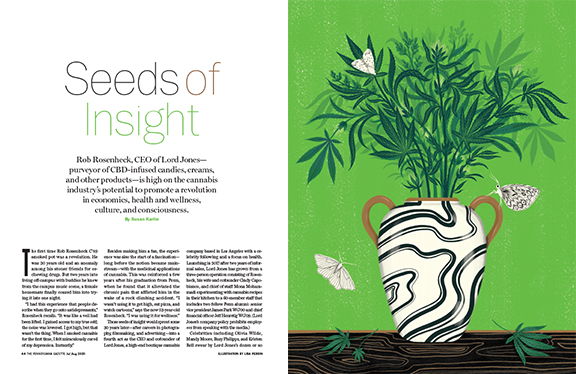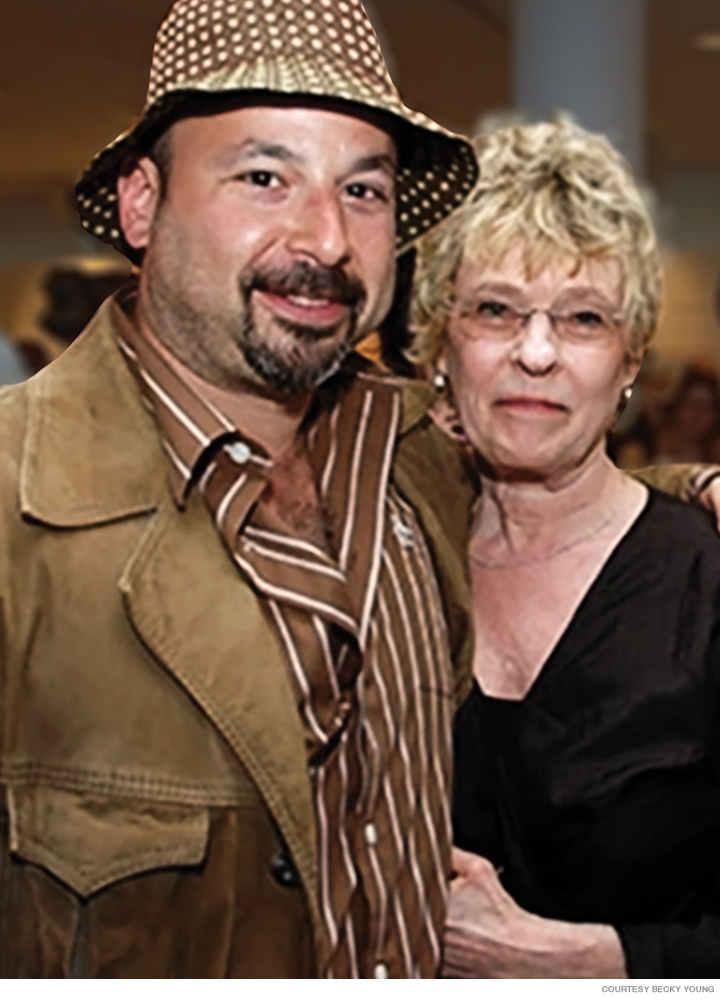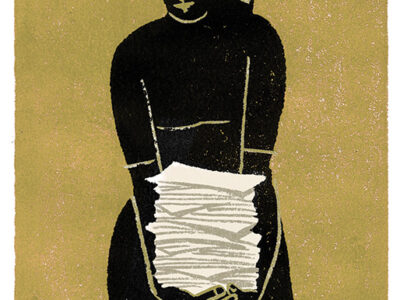
Rob Rosenheck, CEO of Lord Jones—purveyor of CBD-infused candies, creams, and other products—is high on the cannabis industry’s potential to promote a revolution in economics, health and wellness, culture, and consciousness.
By Susan Karlin | Illustration by Lisa Perrin

The first time Rob Rosenheck C’89 smoked pot was a revelation. He was 20 years old and an anomaly among his stoner friends for eschewing drugs. But two years into living off-campus with buddies he knew from the campus music scene, a female housemate finally coaxed him into trying it late one night.
“I had this experience that people describe when they go onto antidepressants,” Rosenheck recalls. “It was like a veil had been lifted. I gained access to my true self; the noise was lowered. I got high, but that wasn’t the thing. When I smoked cannabis for the first time, I felt miraculously cured of my depression. Instantly.”
Besides making him a fan, the experience was also the start of a fascination—long before the notion became mainstream—with the medicinal applications of cannabis. This was reinforced a few years after his graduation from Penn, when he found that it alleviated the chronic pain that afflicted him in the wake of a rock climbing accident. “I wasn’t using it to get high, eat pizza, and watch cartoons,” says the now 53-year-old Rosenheck. “I was using it for wellness.”
Those seeds of insight would sprout some 30 years later—after careers in photography, filmmaking, and advertising—into a fourth act as the CEO and cofounder of Lord Jones, a high-end boutique cannabis company based in Los Angeles with a celebrity following and a focus on health. Launching in 2017 after two years of informal sales, Lord Jones has grown from a three-person operation consisting of Rosenheck, his wife and cofounder Cindy Capobianco, and chief of staff Mona Mohammadi experimenting with cannabis recipes in their kitchen to a 60-member staff that includes two fellow Penn alumni: senior vice president James Park WG’00 and chief financial officer Jeff Henretig WG’09. (Lord Jones’s company policy prohibits employees from speaking with the media.)
Celebrities including Olivia Wilde, Mandy Moore, Busy Philipps, and Kristen Bell swear by Lord Jones’s dozen or so products of hemp-derived broad-spectrum CBD oil-infused confections, capsules, tinctures, skincare, and bath salts. Ranging from $30 to $100, they retail online at LordJones.com, and in over 1,000 retail outlets across the US, including Sephora, SoulCycle, The Standard Hotels, and Neiman Marcus. The company made Fast Company’s Most Innovative Companies list for 2019, and has appeared in stories in the New York Times, New Yorker, and elsewhere.
“We’ve never paid for a celebrity endorsement,” Rosenheck says. “The brand is successful because we spent two years learning the cannabis industry, the law, the plant, the chemistry, and how to make our formulations to make this a best-in-class product.
“We always tried to be frugal with every dollar we had. In 2018, our business took off and we experienced 900 percent growth,” he says, declining comment on 2019 figures. (MarketWatch reported that unnamed sources put 2018 revenues at $2-4 million and a monthly run rate of $2 million in midsummer of last year. A Lord Jones spokesperson maintains those figures are incorrect but declined to go into further detail.)
Last September, Canada’s Cronos Group, a NASDAQ-listed cannabinoid company, acquired Redwood Holdings Group, the private holding company cofounded by Rosenheck and Capobianco that had owned Lord Jones and three other subsidiaries, for $300 million in cash and stock. The pair joined Cronos, but still run Lord Jones, and intend to use the cash infusion to expand into international markets and other sales channels.
“We treat this as a start-up, and run it very lean and mean,” says Rosenheck. “We have a very old-fashioned view of business: make a good product and protect our margin, give value to our customer, and have really talented, smart people we can trust. That’s the key to business in general. The main difference between this and any other start-up is you have to have a lot of lawyers.”
A Confusing Business
Marijuana is legal for either medical or recreational use in 33 states and Washington, DC, but remains illegal under federal law due to its psychoactive compound, THC (tetrahydrocannabinol). But the government is slowly relaxing its stance. The 2018 Farm Bill legalized hemp, a low-THC-level cannabis plant from which CBD (cannabidiol) can be derived. The law’s passage enabled the sale of CBD oil from hemp containing less than 0.3 percent THC in all 50 states. But CBD oil from marijuana is still federally illegal. Moreover, the Food and Drug Administration (FDA) has yet to approve any CBD products other than Epidiolex, a prescription drug for certain seizure disorders in children. (The FDA has also approved three other drugs containing synthetic THC and THC-like compounds—Marinol, Syndros, and Cesamet—for treating nausea from chemotherapy and weight loss in AIDS patients.)
The FDA and scientific evidence need to catch up to public interest, which centers on the notion that CBD may promote “wellness.” Although the agency recognizes the potential therapeutic uses of CBD, the limited data it has reviewed indicates safety risks such as liver injury, male reproductive toxicity, and medicine interactions, according to its website. While the FDA prohibits marketing CBD as a dietary supplement or food additive, it has focused enforcement on companies claiming to treat psychiatric disorders and diseases like cancer, Alzheimer’s disease, and diabetes.
Still, evidence gathering is slowly proceeding. Last year, the FDA held its first public hearing on CBD, while the government’s National Center for Complementary and Integrative Health awarded $3 million in grants to study CBD use in treating chronic pain. CBD research may also get a boost from a novel synthetic stable CBD acid. EPM, a Los Angeles-headquartered start-up, has developed a more potent and consistent solution for the pharmaceutical industry that doesn’t involve plant extracts, which face murkier regulatory guidelines.
“Right now we’re in a regulatory void, because you have a law signed by the president that legalizes CBD and authorizes the FDA to regulate it, and the FDA has not,” says Rosenheck. “And that’s why you have all this confusion in the marketplace.”
That makes cannabis a potentially lucrative, but precarious, business. Arcview Market Research and BDS Analytics estimate that legal domestic cannabis sales grew 46 percent to $15 billion in 2019 and anticipate a $20 billion domestic and $43 billion global market by 2024.
Brands fronted by celebrities ranging from Snoop Dogg to Martha Stewart, corporate chains like MedMen, and novelty niches like Kosher Kush (which bills itself as the first commercial cannabis to be blessed by a rabbi) are all vying for a position in the industry. College students now regard it a legitimate career track. By way of example, Harvard, Yale, Stanford, New York University, and University of California, Berkeley have cannabis business clubs, with Yale running the first US business school cannabis conference earlier this year. Others, including Cornell, University of Maryland, UCLA, University of Washington, and Colorado State University offer courses, programs, or degrees in the agronomics, chemistry, and legalities of cannabis. At Penn, the three-year-old student-run Wharton Cannabis Business Club hosts industry speakers and networking events for 75 members who pay $30-40 in annual or biennial dues. Last year, the Wharton Club of New York presented a sold-out cannabis-themed panel, with other alumni organizations following suit, while Wharton Magazine highlighted several Penn alums already populating the burgeoning industry.
“Wharton students have always had an interest in emerging industries, like blockchain and, now, cannabis. It’s interesting, complex, and needs strategic thinkers,” says Wharton Cannabis Business Club copresident Tyler Wigington WG’20 G’20. Last year, the Wharton MBA Career Management office recognized cannabis as an up-and-coming industry and assigned two staff members to undertake employer outreach and advise students in this area, he adds. “They’re closely engaged with our club.”
But hiccups involving state licensing, municipal bans, high taxes, lax law enforcement, lack of banking access, and inconsistent regulation have contributed to industry growing pains and a thriving black market of unlicensed growers and sellers who outnumber their legal counterparts. Rosenheck hopes that eventual FDA oversight will better protect the consumer and thin out competition. “It’s hard to comply with regulation. We know how to do it, but not that many others do,” he says. “So you have everybody and their brother now launching a CBD company, because there’s no regulation.”
Life at Penn
Rosenheck’s circuitous path to the cannabis industry was presaged by his passage through Penn.
Love brought him to the University from his hometown of Bridgewater Township, New Jersey. In a way.
“I didn’t know where I wanted to go to college or what I wanted to do,” he explains. “There was a girl from camp who was at Penn, and I had a crush on her, so I was like, ‘Why don’t I go to Penn?’” He got in and became a pre-med student for no reason other than that his father was a doctor.
But he quickly gravitated to the alternative music scene on campus, having earlier sought solace from a miserable high school experience by attending punk concerts at nearby Rutgers University. He got involved in the Penn Union Council Concert Committee, which he co-ran as a sophomore, booking and producing campus concerts by artists ranging from Stevie Ray Vaughan to Elvis Costello to Philip Glass. “It became an obsession,” he says—which didn’t help with his grades.
His sophomore year ended with academic probation and a request from the University that he take a year off to get his act together. “I had a GPA of, I think, 1.08,” Rosenheck laughs. “I love the idea of healing and helping people, but I didn’t have the discipline to study to become a physician. And I wanted to promote rock concerts. My parents were incredibly despondent that I was asked to leave Penn. But it ended up being the greatest thing that ever happened to me.”
He spent what would have been his junior year working at a Rittenhouse Square camera store and exploring a childhood passion for photography—meanwhile continuing to chair the concert committee. “No one knew,” he says gleefully. “I was going to work every day in Houston Hall and promoting more rock concerts than had ever been produced at Penn. Every concert sold out, the University was making a profit, and they were delighted.” He expanded into Philadelphia’s punk and new wave music scene, cross-promoting Penn shows with downtown hotspots like Revival, Black Banana, and Memphis. For a time, he even toyed with the idea of pursuing concert promotion as a career.
“The year I took off caused me to do a lot of soul searching,” he says. “When I returned, I got very serious about wanting to learn, but I didn’t want to be on a career track. Young people are put onto a track when they’re far too young to know who they are and what they want.”
Rosenheck plunged into an eclectic assortment of classes—photography, English, oceanography, marketing, economics, and more—pulling As, but almost failing to graduate because nothing in this patchwork added up to a major. Fortunately, Norma Kahn, the late assistant dean for advising, “took pity on me,” he says, calling her “the patron saint of lost souls who have promise at Penn.”
Rosenheck’s interest in photography had led him to film classes at the Annenberg School for Communication, with an eye towards directing. Amos Vogel, the late film studies professor and New York Film Festival founder, became his academic advisor. With Kahn’s help, Rosenheck designed an individualized major called Film as Artifact, which “stitched together all these things that I had studied under the guise of film theory,” he says. That allowed him to graduate.
But his most pivotal influence was the photographer Becky Young, who started Penn’s photography department and taught classes for 30 years before retiring in 2005. Rosenheck joined her class as a junior in 1987 after honing his skills during his year off. “Becky was the most transformational figure in my life, because she taught me how to see,” he says. “She opened up the world of possibilities for her students and broke down all of these myths of what you’re supposed to do in your life. There were no rules. She inspired people to think differently.”

Young, who has remained in touch with Rosenheck over the years, was equally impressed. “I knew from the time I met him that this guy was going to go places,” she says. “He knew who he was. He was very self confident without at all being cocky. He was a great communicator—both verbally and visually. He was very interested in environmental issues and a very good businessman. He knew what he wanted, and he went after it. It never surprised me that he was as successful as he was.”
Young mentored Rosenheck to the extent that, when she decided to shift focus to her painting at the end of his junior year, she began referring photography clients to him. “And with that, I became a professional photographer,” he says.
In his senior year, a college friend who’d landed a job with the satirical magazine Spy tapped Rosenheck as its cocktail party photographer. Every couple of months he took the train to New York to snap the rich and infamous at Spy events.
For five years after graduation he split his time between photography gigs in Philadelphia and New York and traveling across the country photographing people and landscapes. For six weeks he was an artist-in-residence at Joshua Tree National Park, though he often lived out of his car. It was during this period that he wandered into a Barstow, California, thrift store and stumbled upon a hand-carved wooden sign spelling love in bright red 1960s-era lettering with a yellow outline. Something clicked.
“I felt like I was struck by a bolt of lightning, like it was divine inspiration,” he says. “I started to photograph everybody I met with this sign. I went back to New York to shoot an event for Spy. Joan Rivers was there, and I asked her to hold up the sign and took a picture of her.” He managed to land photos of Nelson Mandela, Bill Clinton, Mikhail Gorbachev, and Margaret Thatcher holding the sign. He camped out in a men’s room for three hours to sneak into an Oprah Winfrey book signing party and talk her into posing with it.
His friend at Spy suggested he turn the collection into a book. Published in 1996, The Love Book became a bit of a sensation. “It was the number one-selling book in Tokyo, and covered in New York Magazine, the New York Times, and Entertainment Weekly,” he says. “I had exhibitions across the country and around the world because of this book.” (The Gazette even wrote about it in the days before our website launched.—Ed.)
Young also hired Rosenheck as a lecturer in the photography department, where he taught classes in photography, printing techniques, and on creating visual diaries from 1996 to 2000. The two occasionally taught classes and graded portfolios together. “I learned how to become a teacher from Becky,” he says. “It was really about how do you see, how do you break down the boundaries of sight and the limitations that you put on yourself as a person.”
“It was so lovely to have him come back, not as my student, but as my colleague,” says Young, who continues her painting and multimedia work from an airy apartment studio in Rittenhouse Square. “He had a great way of communicating with students and getting them excited about what was going on around them.”
The Move West
While teaching at Penn, Rosenheck was living with Capobianco, who was then the head of publicity at Banana Republic. The couple eventually married in 2000. When a promotion to VP of global marketing at The Gap prompted a move to San Francisco later that year, Rosenheck resurrected his college interest in filmmaking, creating documentaries for the Center for Environmental Health in nearby Oakland and writing screenplays.
The pair also became medical marijuana patients, California having legalized cannabis for pharmaceutical use in 1996. Rosenheck was still feeling the effects of a 1991 rock-climbing accident. “I fell 22 feet off a cliff in Utah, was on crutches for two years, and had seven surgeries. My whole leg had to be rebuilt,” he says. “So when I moved to California, I discovered how I could use cannabis topically to provide aid to chronic pain.”
In 2003, Capobianco left The Gap to start her own marketing agency, Capobianco & Associates, enabling a move to Los Angeles, where Rosenheck could more aggressively pursue filmmaking. He came maddeningly close to getting two of his screenplays produced. But when both fell through, Rosenheck lost patience. “I became disillusioned with the whole process of getting permission to make a movie,” he says. “It’s fickle and you have no control.”
Priorities were shifting, anyway. In 2005, the couple had twin girls and needed to make more money. Rosenheck joined his wife’s agency, which focuses on the fashion, lifestyle, food, and wellness industries. What Rosenheck calls a “watershed moment” occurred when Colorado voted to legalize recreational cannabis use in 2012; he and Capobianco spied a potential goldmine.
“At the time, the cannabis industry was filled with seedy dispensaries and products that weren’t labeled, so you had no idea what you were consuming,” he explains. “We saw this as a monumental opportunity to normalize cannabis use, elevate it, and position it as a health and wellness product, because that’s how we understood it. We shopped at Whole Foods, we were Equinox members, Cindy would buy her cosmetics from Sephora. And there was nothing in cannabis that spoke to that consumer. That was the idea behind creating Lord Jones.”
Its moniker was a calculated mash-up of an everyday name with an aristocratic title. “We wanted to elevate the cannabis category,” he adds. “Lord Jones is an oxymoron. Jones is the name of the common man, so by elevating Jones to royalty, we were anointing the humble weed.”
On the advice of his attorney, Rosenheck began weekly reconnaissance missions to Colorado in 2013, meeting industry players, learning the law, and studying the system. During that time cannabis was legal to possess but not to sell there, while the state set up the necessary regulatory structure. “Cindy and I read every single piece of scientific cannabis research that we could get our hands on. There was relatively little of it here, but a great deal conducted in Israel,” says Rosenheck. Israel has long been a leader in medical cannabis research, which has included isolating CBD and THC in marijuana, and its effects on issues ranging from pain and mood to inflammation and autism.
Research led them to edibles and topicals. The market was already saturated with smokable products, and their work with food and personal care lines mirrored delivery systems for cannabis-infused packaged goods. They spent two years developing their product, designing the look and feel of the brand, and finding reliable cannabis sources by hiring a lab to test batches of product.
“We loved the idea of candy, because you could achieve pharmaceutical levels of accuracy and potency in the dosage,” says Rosenheck. “That’s what was key, because before, you’d go into a dispensary for an edible and it would be a giant cookie in a plastic bag with a staple without a label. You didn’t know what any of the ingredients were or how much to consume, and with a candy, you could make one bite-size piece of candy and you’d know exactly what was in it.
“We hired a candy chef to teach us how to make it,” he adds. “I would make and infuse it, then Cindy would enrobe it in chocolate. Mona, who was our right hand, would sprinkle the salt on it and package it. The three of us made every piece of Lord Jones sea salt caramel for the first year of the company.”
They began selling their products through the Hollywood Hills Wellness Association, a nonprofit medical marijuana collective they founded in 2015. The knowledge they gleaned from the collective would ultimately inform the current Lord Jones line. Initially, their products contained THC. But in 2017, after learning more about the medicinal properties of CBD, Rosenheck and Capobianco shifted to solely selling hemp-derived CBD products, dissolved the collective, and launched the Lord Jones brand.
“People wanted them, and we could sell them across state lines,” says Rosenheck. “One day we plan to return to THC, when marijuana THC is federally legalized.”
Their foresight and preparation paid off. By the time the laws relaxed, they had a viable business in place. In 2016, California passed a ballot measure legalizing the sale and distribution of recreational cannabis beginning in 2018. In late 2018, the Farm Bill legalizing hemp became law, thus allowing the sale of hemp-derived CBD products in every state.
The Next Chapter
When the coronavirus pandemic hit the US in March, cannabis retail sales had been increasing by a whopping 23 percent annual rate, which was likely to grow with people spending more time at home. Amidst tightening restrictions and lockdowns, many states allowed cannabis dispensaries to stay open as “essential businesses.”
“Cannabis sales are doing great and are going to do better, provided companies have enough supply,” says Arcview founder and CEO Troy Dayton. “The downside is that capital is drying up with the stock market tanking. So while, relatively, cannabis is going to do better than all other sectors, everybody is going to be doing much worse from an investment standpoint. When the world shifts, we can expect the cannabis industry to rally.”
In the next few years, Rosenheck plans to expand the Lord Jones product lines and begin distributing them internationally. He’d also like to eventually return to Penn to teach or share his Lord Jones experiences with students. “We are in the midst of a revolution,” he says. “Cannabis holds the promise of an economic revolution, a health and wellness revolution, a cultural revolution. But at its center, cannabis presents a revolution of consciousness.”
Susan Karlin C’85 is an award-winning journalist in Los Angeles who has written for Fast Company, the New York Times, Newsweek, and NPR.She also loved Becky Young’s photography class.




